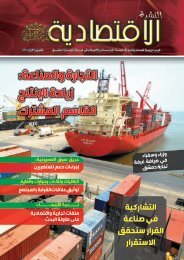SIGAR
2017-01-30qr
2017-01-30qr
You also want an ePaper? Increase the reach of your titles
YUMPU automatically turns print PDFs into web optimized ePapers that Google loves.
<strong>SIGAR</strong> OVERSIGHT ACTIVITIES<br />
indefinite-delivery/indefinite-quantity contracts for Promote to three<br />
prime contractors to implement the program: Chemonics International,<br />
Development Alternatives Inc., and Tetra Tech Inc.<br />
As of October 30, 2016, USAID has committed $280 million to Promote<br />
and has sought to raise an additional $200 million from foreign donors.<br />
When USAID announced the program in 2013, then-Administrator Rajiv<br />
Shah, stated, “The program will make available more than $400 million dollars<br />
with contributions of nearly $200 million dollars from the United States,<br />
and we seek to raise more the $200 million dollars from other international<br />
donors many of which have already expressed a willingness to invest.”<br />
However, more than a year later when the contracts were awarded in<br />
October 2014, no other donors had committed funds to the program.<br />
In March 2015, <strong>SIGAR</strong> wrote to then-Acting Administrator Alfonso<br />
Lenhardt to request information related to the development and initial<br />
implementation of the Promote program. <strong>SIGAR</strong>’s letter expressed concern<br />
about whether USAID would be able to effectively implement, monitor, and<br />
assess the impact of Promote.<br />
In response to the inquiry about international donor commitments,<br />
USAID stated that it “realized early on that the Promote project had great<br />
potential to engage other donors increasingly interested in the issue of<br />
women’s rights” and that it “is evaluating potential Promote partnership<br />
opportunities with other international donors.” However, since then, USAID<br />
has reported that it has still not obtained any international commitments to<br />
the program.<br />
In addition, <strong>SIGAR</strong> was concerned that a large portion of the funding<br />
USAID has committed to Promote may go mostly to U.S. contractors, rather<br />
than spent to directly benefit Afghan women. These concerns are shared by<br />
Afghan women themselves. In late August and early September 2016, a team<br />
of female <strong>SIGAR</strong> officials went to Afghanistan on a fact-finding mission to<br />
identify the major challenges facing Afghan women. The <strong>SIGAR</strong> team interviewed<br />
more than 40 prominent Afghan women, including President Ghani’s<br />
wife, First Lady Rula Ghani. Among other things, <strong>SIGAR</strong>’s interviews<br />
showed that, “As with many other U.S. aid projects, they fear that despite<br />
what appears to be generous funding, a large portion will be absorbed by<br />
U.S. contractors, leaving little to actually reach Afghan women.”<br />
To help ensure that the Promote program is successful in achieving<br />
important benefits for Afghan women, <strong>SIGAR</strong> recently initiated an audit<br />
to examine USAID’s efforts to implement, oversee, and evaluate Promote<br />
since its launch in November 2014. In support of that audit, and to better<br />
understand the reasons for the lack of international donor support and<br />
ongoing concern related to security and overhead costs, <strong>SIGAR</strong> inquired<br />
about: (1) international donor outreach for Promote and potential donors<br />
reasons provided, if any, for opting not to donate; (2) steps USAID took<br />
to identify and eliminate duplication of efforts by Promote activities and<br />
REPORT TO THE UNITED STATES CONGRESS I JANUARY 30, 2017<br />
35







